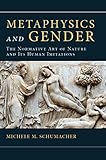Metaphysics and gender : the normative art of nature and its human imitations / Michele M. Schumacher.
Material type: TextPublisher: Steubenville, Ohio : Emmaus Academic, [2023]Copyright date: c2023Description: xii, 193 pagine ; 24 cmContent type:
TextPublisher: Steubenville, Ohio : Emmaus Academic, [2023]Copyright date: c2023Description: xii, 193 pagine ; 24 cmContent type: - testo (txt)
- senza mediazione (n)
- volume (nc)
- 9781645852902
- 9781645852919
- 305.3 23/eng/20230608
- HQ 18.5.S38 2023
| Item type | Current library | Call number | Status | Barcode | |
|---|---|---|---|---|---|
 Opera (Magaz.)
Opera (Magaz.)
|
Biblioteca "Angelicum" Pont. Univ. S.Tommaso d'Aquino Temporary Library | HQ 18.5.S38 2023 (Browse shelf(Opens below)) | Available | 0030221841 |
Include bibliografia: pagine 161-176.
Introduction -- Metaphysics and gender -- Underlying analogies : nature and art, nature and ethics -- The Inversion of these analogies by Sartrian Philosophy and gender theorists -- A Presentation of the chapters -- The Artistic altering of bodily sex : An Ideological revolution.
"The emergent "science" of transgenderism and related philosophies of gender propose a full-scale inversion of the understanding of God, man, and the created order articulated in classical metaphysics, undermining and parodying both the causality and ontology voiced by Genesis 1:27 ("God created man in His own image, . . . male and female He created them"). Whether through subversive performative identity or by surgical sex change, the divinely made human person is now threatened with abolition and replacement by the self-made man and the man-made woman. In Metaphysics and Gender, Michele M. Schumacher offers a corrective to this distorted and distorting outlook, calling for the recovery of an anthropological vision rooted in recognition of the normative divine "art" of nature and of the likeness-and far greater unlikeness-between divine and human causality. Surveying contemporary transgender trends, Schumacher identifies and excavates their conceptual and ideological foundations in the gender theory of Judith Butler, the existentialist feminism of Simone de Beauvoir, and the atheistic existentialism of Jean-Paul Sartre. To the erroneous philosophical presuppositions of these thinkers Schumacher contrasts the metaphysically grounded thought of Aristotle and Thomas Aquinas, advancing their positive account of the good of creation and of the meaning of ethical norms, human freedom and natural inclinations, and embodiment, and mounting a timely and trenchant defense of the divinely created human person".


